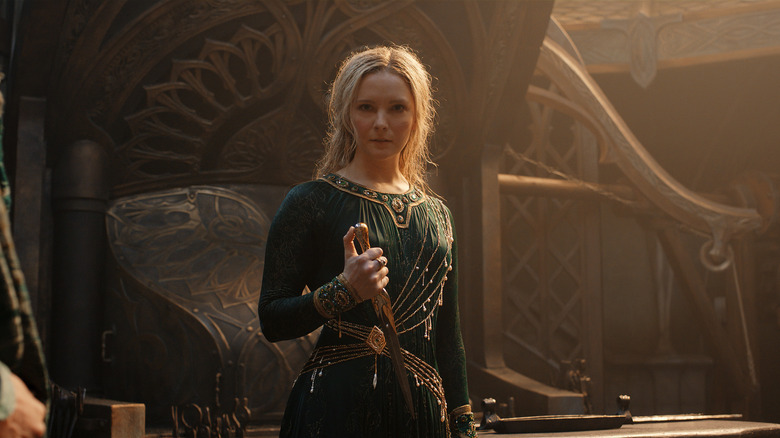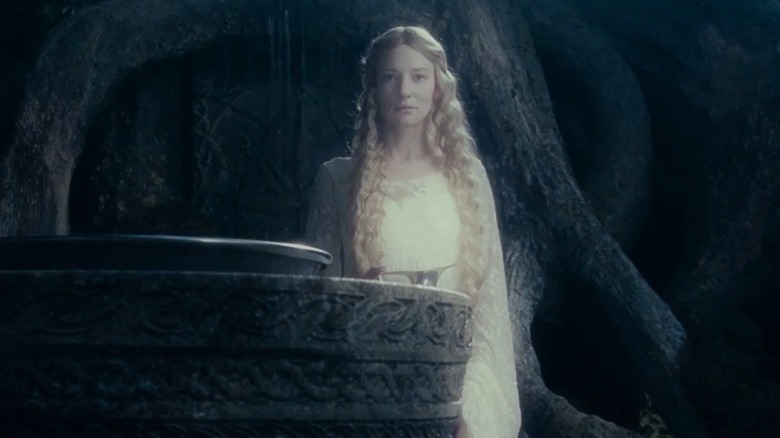The Rings Of Power: Morfydd Clark Enjoys Galadriel's Frightening Disposition
One of the biggest differences between Peter Jackson's "The Lord of the Rings" movies and JD Payne and Patrick McKay's "The Rings of Power" series is the portrayal of Galadriel. Jackson's films depict a stoic, powerful Elf leading her people from within a Golden Wood. Payne and McKay's iteration gives us a much younger, more headstrong, and somewhat lost version of the character.
Many of the nuances between the characters can be chalked up to artistic interpretation, but both versions of Galadriel are clearly inspired by J. R. R. Tolkien's source material. Jackson's Galadriel (as iconically portrayed by the great Cate Blanchett) is regal and cool-headed. On "The Rings of Power," Galadriel (wonderfully represented by Morfydd Clark) is burdened by the weight of the past. She's still wandering in exile, processing the loss of loved ones and trying to resist an Evil that seems inevitable.
While each Galadriel is unique, there's one aspect that shines through with both adaptations: she's strong — one might even say frighteningly so. In fact, Clark said something similar in an interview with Nerdist where the Welsh actor explained how much she likes Galadriel's overpowering disposition.
"I think something with Galadriel that I feel really passionate about," Clark said, "is that people find her frightening, like, Boromir calls her a witch. She's seen as this frightening sorceress. She's not like, 'I'm so lovely.' She's got an edge to her, and she can be frightening. And I love frightening women."
Galadriel is frightening in Tolkien's writings, too
J. R. R. Tolkien clearly respected the power that Galadriel wielded. The author didn't sugarcoat how people felt about the mysterious matriarch of Lothlórien around his fantasy world, either — especially when it came to her reputation among Humans.
As Morfydd Clark mentioned in the above interview, Boromir is initially very distrustful of Galadriel. In the "Fellowship of the Ring" book, the Man of Gondor hesitates when the Company reaches the Golden Wood, saying, "But of that perilous land we have heard in Gondor, and it is said that few come out who once go in; and of that few none have escaped unscathed."
In "The Two Towers" book, when Éomer hears that Aragorn, Legolas, and Gimli have passed through Lórien, his response is, "Then there is a Lady in the Golden Wood, as old tales tell!" He adds, "Few escape her nets, they say. These are strange days! But if you have her favour, then you also are net-weavers and sorcerers, maybe." In that same book, even the wise Faramir propagates this witch-Galadriel sentiment when he tells Frodo, "If Men have dealings with the Mistress of Magic who dwells in the Golden Wood, then they may look for strange things to follow."
In Peter Jackson's "The Fellowship of the Ring" film, Gimli (John Rhys-Davies) embodies all of this sentiment when he enters Lórien for the first time and says, "They say that a great sorceress lives in these woods. An Elf-witch of terrible power."
While Galadriel is clearly one of the good guys, she has no problem operating with a terrifying reputation. What will be interesting is watching how "The Rings of Power" turns the loose-canon elements of Young Galadriel's terror into the stately, confident trademark intimidation of the Lady of the Golden Wood.

